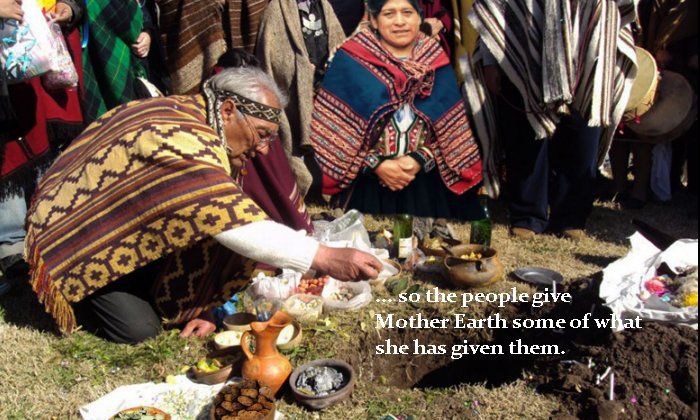Mama Pacha: Respected And Feared Supreme Goddess Of The Andean People
A. Sutherland - AncientPages.com - In our earlier articles on Ancient Pages, we described Mama Ocllo, Mama Cocha, Mama Quilla, who are prominent deities in the pantheon of Inca people.
Our today's article is devoted to Mama Pacha (Pachamama), one of the most important and deeply revered deities in beliefs of the pre-Columbian civilizations of the Andean region.
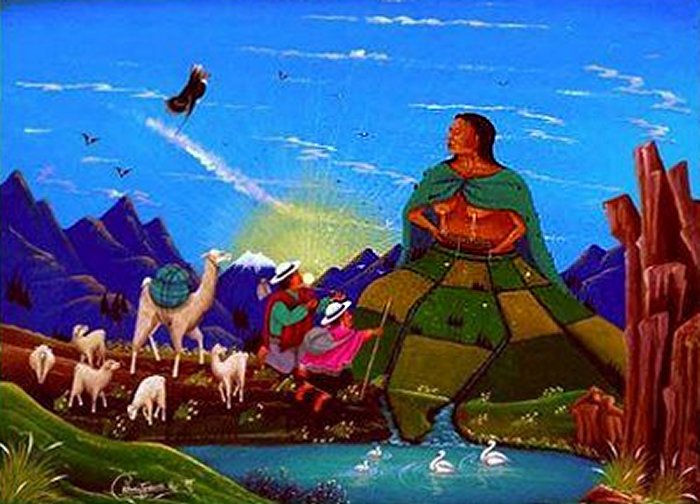 Mama Pacha - the one who fertilizes and protects the crops. Image source
Mama Pacha - the one who fertilizes and protects the crops. Image source
In the mythology of the Incas, people venerate Mama Pacha (or Pachamama), a goddess whose name means Mother Earth. As the protector of nature, she was always present in the daily life of people.
Her name symbolizes the highest expression of reverence because this deity not only cares for the material but also the spiritual world. Mama Pacha is the mother of Inti, the sun god, and Mama Quilla (Killa), the Moon goddess of marriage and fertility. Some beliefs confirm that she is also the wife of Inti, her son.
The goddess is often depicted as an elderly woman of small stature, with too large legs and head, in relation to the body. Sometimes she wears a hat on her head, and thin Indian braids hang from her shoulders. In her hands, she holds a snake that serves as a kind of lasso.
Why Is Pacha Mama So Important To Inca People?
Pacha Mama is the one who fertilizes and protects the crops in the fields, which are the Incas' essential production necessary for survival. In ceremonies in her honor, she is always thanked for all she offers, so the people give Mother Earth some of what she has given them.
It is a symbolic offering in the form of products such as potatoes, chicha liquor, alpaca meat, coca leaves, goose, and even small silver, copper and even gold figurines dressed in elaborate garments, often decorated with feathers.
According to tradition, the Inca place offerings in caves and crevices, on mountaintops, or buried near buildings or fields.
It is also a beautiful gesture, in which man returns to the Earth what he has taken from it. The primary purpose is gratitude and reciprocity between the human being and nature.
These rituals - widely known as 'payment to the land' - are still practiced in the region of Cusco, Machu Picchu, and other Andean people, who, in this way, traditionally honor of Pacha Mama invoking her help in problems with the crops.
In the vicinity of Cúsco, Peru, there is an impressive Inca infrastructure called Moray that could have been an experimental farm as the terraces descend into the center of each circular formation. There, they created different micro-climate from the previous terrace.
Such terrace-like gardens were probably used by the Incas to experiment with different varieties of plants to improve their crops.
Image source
Perhaps they wanted to show Mama Pacha how much they care for the land they can use to feed their families.
Mama Pacha and Celebrations
Every August 1st (before the sowing season), Mama Pacha, the goddess of nature, has a special day devoted to her. Still, the celebrations are performed in a different way depending on the regions. For example, in Bolivia, Peru, or Argentina, the rites may vary.
Pachamama and her son-husband, Inti, are honored as benevolent deities in the area of the former Inca Empire – Tawantinsuyu, which includes the Andean mountains in present-day Ecuador, Bolivia, Chile, Peru, and northern Argentina.
Traditionally the Incas give food and drink to Mother Earth, and this rite - guided by the elderly - is performed using a hole in the Earth, once they place their offering and cover it, the community begins to dance. In this way, the people express their gratitude to Mama Pacha, the divinity with unlimited powers.
She oversees planting and successful harvesting, but sometimes, she can suddenly change and act as a dangerous monster dragon causing deadly earthquakes.
The Inca ancient beliefs say that 'phenomena' like drought, too heavy, devastating rains, and earthquakes symbolize the punishment sent by the goddess for not complying with her requests.
Written by – A. Sutherland - AncientPages.com Senior Staff Writer
Copyright © AncientPages.com All rights reserved. This material may not be published, broadcast, rewritten or redistributed in whole or part without the express written permission of AncientPages.com
More From Ancient Pages
-
 Evidence Of Advanced Military Robots In The Ancient World – Unknown High-Tech Examined
Ancient Technology | Jan 13, 2021
Evidence Of Advanced Military Robots In The Ancient World – Unknown High-Tech Examined
Ancient Technology | Jan 13, 2021 -
 Remains at Crenshaw Site Are Local, Ancestors Of Caddo – New Study
Archaeology | Jun 15, 2023
Remains at Crenshaw Site Are Local, Ancestors Of Caddo – New Study
Archaeology | Jun 15, 2023 -
 Never-Ending Battles Between God Ra And Indestructible Apophis In Ancient Egyptian Beliefs
Egyptian Mythology | May 20, 2021
Never-Ending Battles Between God Ra And Indestructible Apophis In Ancient Egyptian Beliefs
Egyptian Mythology | May 20, 2021 -
 Major Underwater Archaeological Find On The Western Coast Of Sicily – Artifacts From The Battle Of The Egadi Islands?
Archaeology | Sep 11, 2023
Major Underwater Archaeological Find On The Western Coast Of Sicily – Artifacts From The Battle Of The Egadi Islands?
Archaeology | Sep 11, 2023 -
 2,ooo-Year-Old Ancient Roman Treasure Found Underwater Of The Coast Of Portofino, Italy
Archaeology | Jan 31, 2019
2,ooo-Year-Old Ancient Roman Treasure Found Underwater Of The Coast Of Portofino, Italy
Archaeology | Jan 31, 2019 -
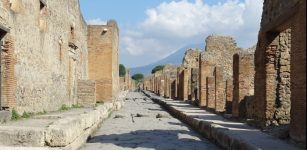 Why Did Ancient Romans Build So Many Straight Roads?
Ancient History Facts | Aug 9, 2017
Why Did Ancient Romans Build So Many Straight Roads?
Ancient History Facts | Aug 9, 2017 -
 Dionysus – Greek God Of Wine, Music, Ritual Madness And Ecstasy Was Born Twice
Featured Stories | Jan 8, 2019
Dionysus – Greek God Of Wine, Music, Ritual Madness And Ecstasy Was Born Twice
Featured Stories | Jan 8, 2019 -
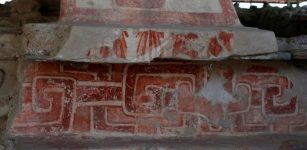 Teotihuacan’s Puzzling Red Glyphs Could Be Unknown Ancient Writing
Archaeology | Sep 22, 2020
Teotihuacan’s Puzzling Red Glyphs Could Be Unknown Ancient Writing
Archaeology | Sep 22, 2020 -
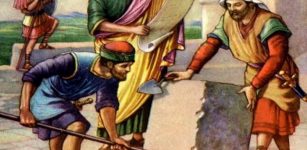 Biblical Events Confirmed: The Jerusalem’s Wall That Nehemiah Built
Biblical Mysteries | Mar 19, 2014
Biblical Events Confirmed: The Jerusalem’s Wall That Nehemiah Built
Biblical Mysteries | Mar 19, 2014 -
 The Controversial History Of Moses – Who Was He Really?
Biblical Mysteries | Sep 13, 2015
The Controversial History Of Moses – Who Was He Really?
Biblical Mysteries | Sep 13, 2015 -
 ‘Arcade’ Of Ancient Mancala Game Boards Carved On Rocks Found In Lewa Wildlife Conservancy, Kenya
Archaeology | Feb 2, 2024
‘Arcade’ Of Ancient Mancala Game Boards Carved On Rocks Found In Lewa Wildlife Conservancy, Kenya
Archaeology | Feb 2, 2024 -
 On This Day In History: Heidelberg University Established – On Oct 19, 1386
News | Oct 19, 2016
On This Day In History: Heidelberg University Established – On Oct 19, 1386
News | Oct 19, 2016 -
 Ancient Ruins Of Nero’s Theater Discovered Under Garden Near Vatican
Archaeology | Jul 27, 2023
Ancient Ruins Of Nero’s Theater Discovered Under Garden Near Vatican
Archaeology | Jul 27, 2023 -
 What Rights Did Viking Women Have?
Ancient History Facts | Mar 19, 2021
What Rights Did Viking Women Have?
Ancient History Facts | Mar 19, 2021 -
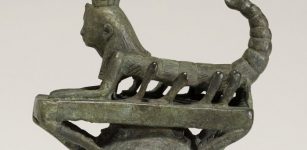 Mysterious Scorpion Goddesses In Myths And Legends
Egyptian Mythology | Jan 26, 2016
Mysterious Scorpion Goddesses In Myths And Legends
Egyptian Mythology | Jan 26, 2016 -
 Unexplained Historical Mass Disappearances – Where Did They Go? – Part 2
Featured Stories | Jun 4, 2019
Unexplained Historical Mass Disappearances – Where Did They Go? – Part 2
Featured Stories | Jun 4, 2019 -
 Intriguing 3,400-Year-Old Multipurpose Pyramid Found In Kazakhstan
Archaeology | Nov 2, 2023
Intriguing 3,400-Year-Old Multipurpose Pyramid Found In Kazakhstan
Archaeology | Nov 2, 2023 -
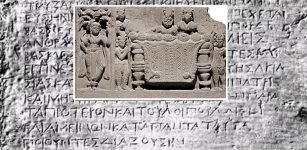 Robots Guarded Buddha’s Relics In Ancient India – Legend Tells
Featured Stories | Jun 28, 2019
Robots Guarded Buddha’s Relics In Ancient India – Legend Tells
Featured Stories | Jun 28, 2019 -
 Does A Baffling Artifact Offer Evidence Of Ancient Extraterrestrial Visitation In New Zealand? – Experts Investigate – Part 2
Featured Stories | Jul 23, 2020
Does A Baffling Artifact Offer Evidence Of Ancient Extraterrestrial Visitation In New Zealand? – Experts Investigate – Part 2
Featured Stories | Jul 23, 2020 -
 Sami People: Facts And History About The Only Indigenous People Of Most Northern Europe
Civilizations | Sep 25, 2016
Sami People: Facts And History About The Only Indigenous People Of Most Northern Europe
Civilizations | Sep 25, 2016

